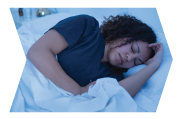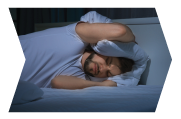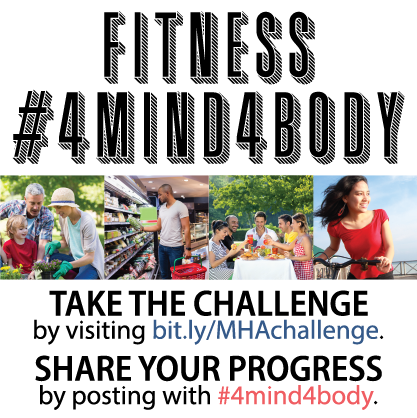You are here
Fitness 4Mind4Body: Sleep

Your physical and emotional health depends so much on how rested you are. Sleep is fundamental to a healthy mind and body – getting a good night’s sleep can make a huge difference in your overall health.
Sleep Affects The Entire Body
It plays a role in our moods, ability to learn and make memories, the health of our organs, how well our immune system works, and other bodily functions like appetite, metabolism, and hormone release.

Sleep Is Important Down To The Cellular Level
| Sleep helps the body to re-energize its cells. |  |
It also increases the amount of space between brain cells to allow fluid to flow and clear away toxins.1 |
How Much Sleep Should You Be Getting?
If you get approximately 8 hours each night, you’ll spend about 1/3 of your life asleep.
Based on the average U.S. life expectancy2, that is 230,680 hours or 26.3 years of sleep in a lifetime.
The amount of sleep you need each night depends on your age. The National Sleep Foundation recommends:3

Quality Of Sleep Matters
Good quality sleep means:4
| Being asleep for at least 85% of the time you are in bed. |  |
Falling asleep in 30 minutes or less. |  |
Waking up no more than once per night for no longer than 20 minutes. |  |
 |
When a person consistently struggles to get enough sleep or good quality sleep, they have a higher risk for health problems like high blood pressure, heart disease, diabetes, depression, and obesity.5 | Poor quality of sleep can increase the risk of developing mental health symptoms like: manic episodes6, a first episode of psychosis7, paranoia8, anxiety9, and depression.10 | |
| Sleep problems affect 50% to 80% of people under the care of a psychiatrist, compared with 10% to 18% of adults in the general U.S. population.11 | Among visitors to mhascreening.org who scored moderately to severely depressed, 95% reported trouble falling asleep or sleeping too much at least several days in the past month.12 |
Tips For A Good Night’s Sleep
- Go to bed and wake up at the same time every day—including weekends. This helps to keep your body’s natural rhythms running on schedule.
- Avoid exercising 2-3 hours before your bedtime. Try to exercise in 30 minute sessions either in the morning or afternoon.
- Get out in the sun. Getting natural sunlight during the day helps to maintain your body’s sleep-wake cycle. Aim for 30 minutes of sun exposure and be sure to wear sunscreen.
- Limit caffeine to the morning. The energy-boosting effects of caffeine can take as long as 8 hours to wear off.
- Don’t eat right before bed – it can cause indigestion and heartburn, which can mess up sleep.
- Nap smart. If you need a nap, take it before 3 p.m. and limit it to an hour.
- If you can’t fall asleep for more than 20 minutes after going to bed, get up and do something calming until you feel sleepy.
- Say no to nicotine. The nicotine in tobacco products and vapes is a stimulant, which can keep you up at night.
- See a doctor if you always feel tired even after getting enough sleep, or have trouble falling asleep every night.
- Some over-the-counter and prescription medications may affect your ability to go to sleep or cause you to sleep for longer than necessary. If you can’t avoid medications, talk to your doctor about changing your dose or the time you take your medicine
- Get rid of anything in your bedroom that might distract you from sleep, like noises or bright lights. The light from screens can confuse your body’s internal clock.
- Go easy on the drinks. Drinking too much before be can make you wake up to go to the bathroom and alcohol gets in the way of reaching the deep and restful stages of sleep.
Join Mental Health America this May as we challenge ourselves to make small changes – both physically and mentally – to create hug gains for our overall health and wellbeing.

If you are taking steps to live a healthy lifestyle but still feel like you are struggling with your mental health, visit www.mhascreening.org to check your symptoms. It’s free, confidential, and anonymous. Once you have your results, we'll give you information and help you find tools and resources to feel better.
Sources
1Sleep drives metabolite clearance from the adult brain. Science. 2013 Oct 18;342(6156):373-7. doi: 10.1126/science.1241224. PMID: 24136970.
2https://data.worldbank.org/indicator/SP.DYN.LE00.IN
3https://sleepfoundation.org/excessivesleepiness/content/how-much-sleep-do-we-really-need-0
4https://www.eurekalert.org/pub_releases/2017-01/nsf-wig011917.php
5https://www.ninds.nih.gov/Disorders/Patient-Caregiver-Education/Understanding-Sleep
6Kaplan K, McGlinchey EL, Soehner A, et al. Hypersomnia subtypes, sleep and relapse in bipolar disorder. (2014). Psychological Medicine. 45(8):1751-1763..
7Ruhrmann S, Schultz-Lutter F, Salokangas R, et al. Prediction of psychosis in adolescents and young adults at high risk. (2010). Archives of General Psychiatry. 67(3):241-51.
8Freeman D, Stahl D, McManus S, et al. Insomnia, worry, anxiety and depression as predictors of the occurrence and persistence of paranoid thinking. (2012). Social Psychiatry and Psychiatric Epidemiology. 47(8):1195-203.
9Goldstein AN, Greer STM, Saletin JM, et. al. Tired and Apprehensive: Anxiety Amplifies the Impact of Sleep Loss on Aversive Brain Anticipation. (2013). Journal of Neuroscience. 33(26):10607-10615.
10Buysse DJ, Angst J, Gamma A, Ajdacic V, Eich D, Rössler W. Prevalence, Course, and Comorbidity of Insomnia and Depression in Young Adults. (2008). Sleep.31(4):473–80.
11https://www.health.harvard.edu/newsletter_article/sleep-and-mental-health
12Proprietary data. mhascreening.org
13https://www.nhlbi.nih.gov/files/docs/public/sleep/healthysleepfs.pdf








this page